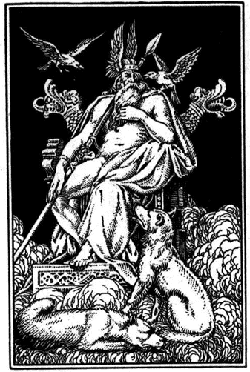
Underworld page
ancient polytheism:
Egyptian Overview
Norse Overview
War Deities
Underworld Deities
 Odin's realm, Odin being more than just the god to oversee the other gods and have general overdeity status, was that of the afterlife. This position was granted him because he was considered the only being able to traverse the dimensions, of which there were several. So in order to be able to handle the dead from all over the Norse multiverse, the god of the dead had to be able to traverse the planes; and since Odin, god of knowledge, as well, was the only one who knew how and was able to move freely across the dimensions, he was given the duty.
Odin's realm, Odin being more than just the god to oversee the other gods and have general overdeity status, was that of the afterlife. This position was granted him because he was considered the only being able to traverse the dimensions, of which there were several. So in order to be able to handle the dead from all over the Norse multiverse, the god of the dead had to be able to traverse the planes; and since Odin, god of knowledge, as well, was the only one who knew how and was able to move freely across the dimensions, he was given the duty.Odin's role as the underworld deity was his most significant (as far as realms of his go). He was the god of First Knowledge, but aside from that, that particular facet of his being was not extremely important.
Odin was often portrayed as flying across the sky as a raven (a creature that has always been, even in ancient times, associated with death and the dead), or as flying across the sky on his eight-legged steed, Sleipnir. Riding this mystical steed, Odin was said to retrieve certain dead and deliver them to underworld kingdom. However, only certain souls were granted admission to Odin's kingdom.
To be allowed into the kingdom of the dead, one had to have died valiantly and/or violently: slain gruesomely in battle; killed while defending one's home; dying while attempting to rescue innocents. These were also generally the people who worshipped Odin: brave and thoughtful in life. This particular feature is a strong connection between Odin's war god attributes, and his underworld god attributes. In both cases, he was worshipped and served by those who were brave and valiant. Also, it was only natural that the intellectual god of war hold the position of ruler of the kingdom of the underworld, as those slain would already be offered to Odin as a war sacrifice, so the concept of death and war were closely tied.
Odin's dominion over death even started with one of his earliest tales. The story goes that Odin impaled himself on Yggdrasil, the World Tree, in order to see the runes of magic and take them. Of course, Odin did not die because, as the god of the afterlife, he held dominion over death. Also, throughout Norse history, enemies slain in battle were offered to Odin by impalement on a spear, paralleling Odin's words on his impalement on Yggdrasil in the poem, H�vam�l:
"I know I hung
on the windswept Tree,
through nine days and nights.
I was stuck with a spear
and given to Odin,
myself give to myself..."

Greek

Egyptian

Norse